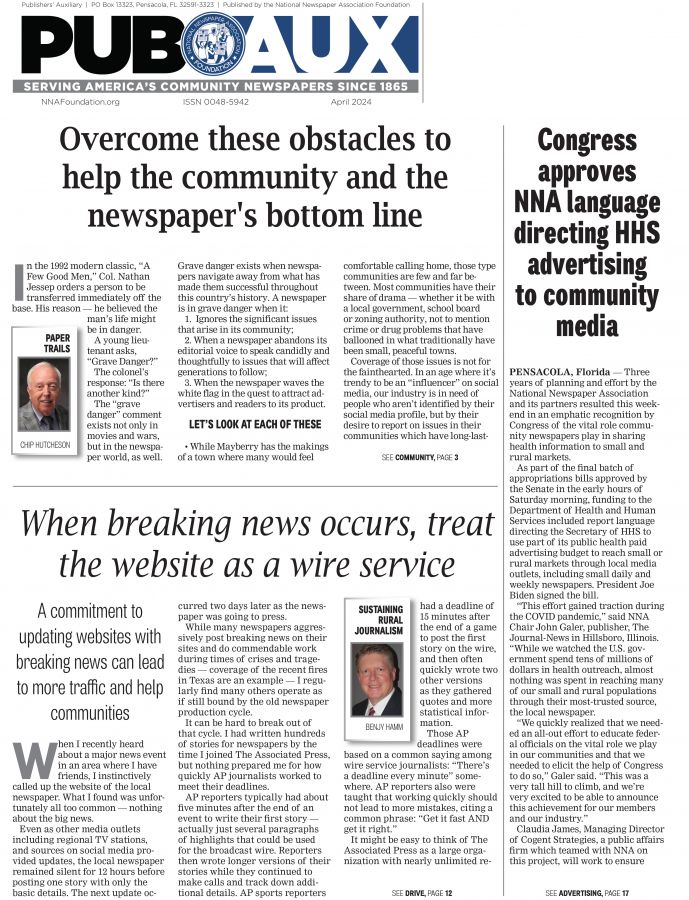ISSUE BRIEF: help for community newspapers
Apr 13, 2020
Background:
Newspapers are considered essential businesses in statewide shut-down orders. Community newspapers serving small towns, rural areas and neighborhoods continue to attempt to publish in most cases even though they have lost all or most of their revenue stream because of mandated shutdowns. Virtually every newspaper has furloughed employees, reduced publishing frequency or instituted pay cuts to get through the COVID-19 emergency. The New York Times reports that about 28,000 news employees have lost their jobs, been furloughed or had their pay reduced — but the Times may not be including all community newspapers in its assessment. Likely, the number is higher.
Survival of the printed newspaper is not assured. Important newspapers in the Chicago area, northern California and elsewhere are either shut down forever or suspended until the outcome of local business conditions is known. More newspapers will follow them unless Congress acts to help these newspapers to continue to serve in a critical time.
Congress has already provided some assistance through the Payroll Protection Program in the CARES Act. But in its haste to help, Congress left important questions unanswered. It also must extend the assistance, recognizing that even after the public health emergency abates, economic conditions will lag for months.
How Congress can help:
1. Advertising revenues are the most important path to sustainability. The federal government already spends heavily on advertising. National Newspaper Association has joined National Association of Broadcasters, News Media Alliance and America’s Newspapers asking Congress to direct that spending to local media. In small towns, for example, educational advertising from the Health Resources and Services Administration could be directed to community newspapers in small towns to help citizens better understand how to protect their health. CDC, NIH, USDA and other important agencies also could support local press entities by redirecting their spending budgets. (https://www.nna.org/media-groups-call-on-congress-to-support-local-news-local-media-amid-coronavirus-crisis)
2. The Payroll Protection Program must be clarified and extended.
a. NNA joins other small business organizations in requesting extension of funding through December 2020. Also small businesses should be permitted to apply for up to three forgivable loans, provided they can demonstrate previous loans were spent for either payroll or completion of essential business services.
b. Congress should permit businesses in the manufacturing sectors to include essential materials and production costs in the forgivable loans. In the case of newspapers, printing costs must be covered so newspapers can carry out their missions. (Congress should recognize that not all small businesses are in the service sector. Without the means of production, there is no business to carry out.)
c. Congress should clarify that the basis for average monthly payroll is the previous 12 months of gross salary and benefits, not net salary and benefits. The SBA lenders across the country are inconsistent.
d. Congress should permit businesses to seek loan forgiveness if they have lost all or most of their customers because of the mandatory shutdowns and have demonstrated a need to right-size their workforces to adapt to current economic conditions.
e. The time period for calculation of any repayment should not begin until shutdown orders in the respective states have been lifted.
3. The services of the United States Postal Service are critical for newspapers.
Most community newspapers are delivered by mail. Particularly in rural areas, regular 6-day mail delivery is an increasingly critical lifeline for communities suffering from the impact of COVID-19. Although some newspapers are able to adequately serve their markets for a time by providing digital only publications, the delivery of the printed newspaper is a critical element for the newspaper’s economic sustainability. It is also is important for residents. The National Association of Counties recently pointed out that half of America’s counties lack sufficient broadband service that meets federal minimum standards. Particularly now, with families putting new stress on the Internet by working at home, the delivery of the printed information can be critical.
Congress has delayed too long in addressing the fragile finances of USPS. The CARES act provided a $10 billion loan, which has been entangled in red tape by the Treasury Department. But Congress must do more. Providing funds to USPS is not a “bailout.” The Postal Service is a federal agency, not a private company. It requires federal funding to do its work in critical times. Congress must work with the USPS Board of Governors, a majority of whom were appointed by the Trump administration, to identify and grant adequate appropriations to maintain universal service.
For more information, contact Tonda Rush, tonda@nna.org.









